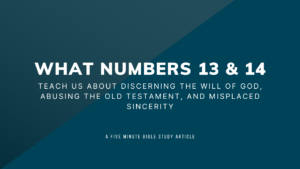![[Tags] Is-America-A-Christian-Nation-1024x576 Is America A Christian Nation? (Pt. 1)](https://fiveminutebiblestudy.com/wp-content/uploads/2021/03/Is-America-A-Christian-Nation-1024x576.png)
Abortion, transgenderism, social justice, rioting, bigotry, and other hot button, moral and social issues in recent years have elicited prayers for the United States of America. America needs to turn back to God and recapture the Christian spirit that was all things America from its very establishment. If only we will humble ourselves, pray, seek God, and turn from our wickedness, then God will heal our land (2 Chron. 7:14). Times are dark and we need a another spiritual awakening! We need Congress to have a God moment! Let’s get back to our Christian roots.
The statements and views expressed above are not my own. They are representative of a general Christian sub-culture in America that can be found without great difficulty, thanks to the gift giver that has allowed every Tom, Dick, and Harry a pulpit in this reverse evolution society: social media. Really though, this is nothing new. Since America’s first heartbeat, and before Abraham Lincoln had Facebook, an appeal has faithfully been made to America’s Christian foundation, with sermons preaching for a return to that foundation. Presidential nominee, John McCain, said during his 2007 campaign for the oval office, “I would probably have to say yes, that the Constitution established the United States of America as a Christian nation,” (qtd. in Labaton). His public statement is a more recent evidence that this spirit and opinion is alive and well, even on the front lines of political battlegrounds. But is it true? Is America really a Christian nation? Or was America a Christian nation? Was America founded as a Christian nation? Humor me as I entertain these questions.
Are We Asking the Same Question?
So many times people huff and puff at each other, when, in reality, there need not be so much huffing and puffing. The root cause of disagreement is frequently an oversight to define the issue at hand. “Is America a Christian nation?” needs more definition before it can be discussed productively. What do we mean by “Christian?” John Fea’s book, Was America Founded as a Christian Nation?, is an all-around excellent read on this subject. It is interesting, informative, transformative, and scholarly all at the same time. Perhaps Fea’s most helpful contribution to answering the question on the cover of his book is found in the preface. There he gives three different questions by which to approach and grade early America as Christian or otherwise.
Question #1: Are the nation’s founding documents or the religious beliefs of the founders in keeping with orthodox (traditional) Christian doctrines? (Fea xvi)
Question #2: Did the behavior, practice, and decisions of the founders and the governments they established conform to the spiritual and moral teachings of Christianity as taught in scripture? (Fea xvi)
Question #3: What was the Christian character of the people who made up the nation? (Fea xvii)
I will briefly examine the appropriateness of each of these guiding questions for the remainder of this introductory article. In Part 2, I will share some of the very interesting and revealing evidences Fea puts forth throughout his book which help verify America’s historical character as a nation.
What is the Best Plan of Attack?
All three questions Fea puts forth in the list above are good questions, as most proponents of a Christian America will use one of these approaches to make their case. John McCain used the first approach in his 2007 interview response by appealing to the Constitution’s Christian character. Others speak in general terms of the quote, unquote “Christian” character of the founding fathers of America. Still others point to Christian politics and manner of life from the past 250 or so odd years as a proof that modern America has gotten away from its Christian roots. Unfortunately, we live in a soundbite culture that loves to take a single spoken word, phrase, or sentence, confiscate the phrase from its original context, and then hold it up as if some great victory has been won. But before we quote Thomas Jefferson out of context and wave our banner of victory, let us examine whether any of the three questions put forth by Fea are truly valid questions to determine America’s Christian character.
Are the nation’s founding documents or the religious beliefs of the founders in keeping with orthodox (traditional) Christian doctrines?
Answering this question might entail a thorough examination of the Articles of Confederation or the Constitution or the Declaration of Independence or some other hallmark document. If any of these documents graded as Christian in nature, all that would prove was that America was founded on Christian principles. There is quite a difference between teaching and practice. It is interesting that the Constitution never refers to God (Fea 150), and even if there were alleged Christian principles incorporated into any such documents, this does not reveal whether or not the writers deemed Christian principles as a helpful means to an end (a respectable society) or perhaps an end in itself (a Christian society). Furthermore, what are “orthodox Christian doctrines?” Many different Christian creeds have been fabricated over the past millennia as a guide to measure membership in designated denominations or measure individuals as Christian in general. Such creeds include doctrinal listings such as: belief in the Trinity, belief in total infallibility and inerrancy of scripture, belief in Jesus Christ as the Son of God, etc. But who makes these fancy lists? Men. Do such fancy lists find themselves in scripture? No. Instead, Paul says, “All Scripture is given by inspiration of God, and is profitable for doctrine…” (2 Timothy 3:16). The only valid creed is all scripture. The only sort of biblical Christian that exists is the one that submits to all scripture. It is not for some panel of religious experts to add or take away from scripture until there is a nice little list of doctrines that are not so narrow as to make the authors seem like some group of self-righteous Pharisees and not so broad as to allow just any hoodlum to be Christian as long as he says, “I’m a Christian.” No. The problem with making orthodox Christian doctrines the test of authenticity is that, any such list is inevitably too short or too long.
Did the behavior, practice, and decisions of the founders and the governments they established conform to the spiritual and moral teachings of Christianity as taught in scripture?
This is the best question to ask in my estimation. Actions speak louder than words. Looking at the history of American politics and international dealings seems to be the best way in gauging the nation’s true identity. This is not a perfect rubric to prove America was a Christian nation, but it is at least a sufficient rubric in determining if America was not Christian by nature. This question will be the guiding principle for the stories shared in the next article.
What was the Christian character of the people who made up the nation?
This question is equally ambiguous as the one we set out to answer in the first place, “Is America a Christian Nation?” They are both too broad. By “the people,” who are we talking about? Are we supposed to examine the beliefs and practices of each and every American since the first Pilgrim who stepped off the Mayflower in determining whether they were Christian or not? Perhaps looking at the majority of the population would prove adequate, but even that would be unrealistic. Many choose to examine the lives of the founding fathers: George Washington, Thomas Jefferson and so on. While the last approach may be novel and interesting, the best it can hope to do is prove that the most influential men in the nation were Christian, and even taking this route, we must be on high alert for soundbite reporting.
Conclusion
Well, I suppose I might as well spill the beans. No, I don’t believe America is a Christian nation. I don’t believe America ever has been a Christian nation in the true sense of the word Christian. I believe that early American policies were founded on and guided by some truly Christian principles, but to say that made or makes America a Christian nation is like comparing apes to humans. Sure, they have some similarities, but one has a soul and one doesn’t. One essential element can make all the difference in the world. We will see in the next article that early American policies, practice, and pulpits all share incriminating evidence for a nation being charged with having Christian origins. In a final article, I will explain from scripture why America never will be a Christian nation, why the idea itself is biblically inconceivable.
Works Cited
Fea, John. Was America Founded as a Christian Nation. Louisville, Westminister John Knox Press, 2011
Labaton, Stephen. “Constitution Based in Christian Principles, McCain says.” The New York Times, 29 September 2007, https://www.nytimes.com/2007/09/29/us/politics/29cnd-mccain.html



Comments
good work! I appreciate this very much.